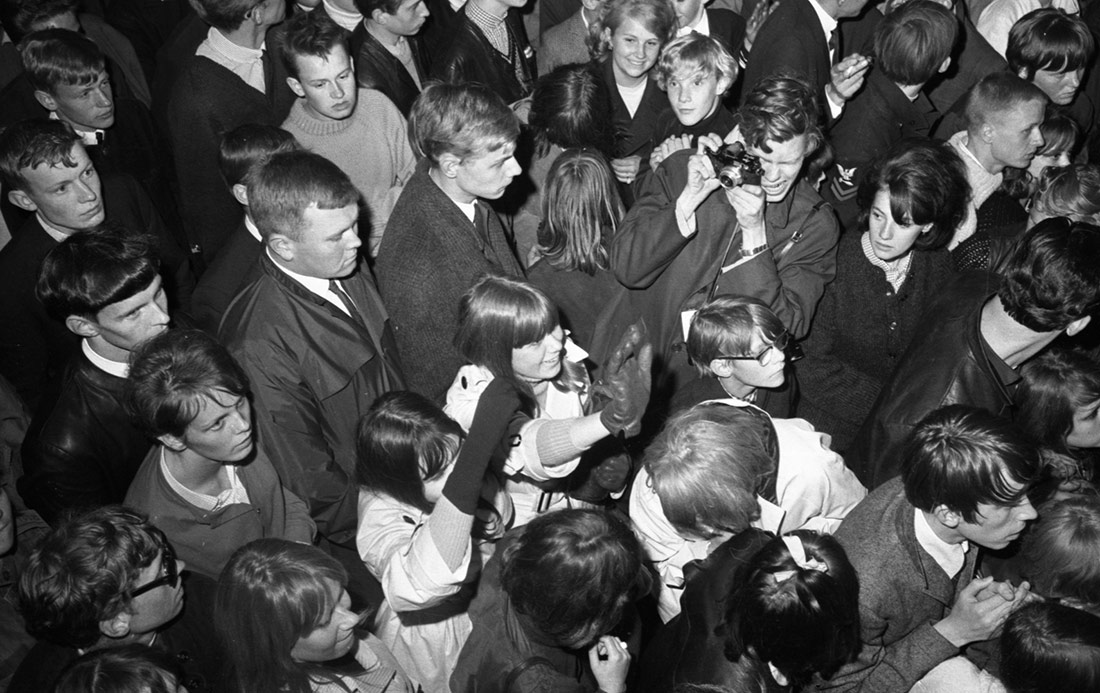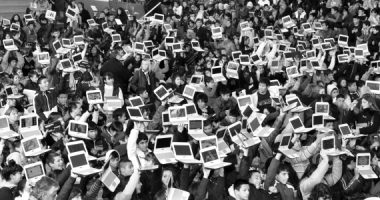
Boy with a camera in the crowd, 1965 | Örebro läns museum | Public Domain
Of the “society of the spectacle” as described by Guy Debord in his most well-known book, there is little left. Social media connected via mobile technology, the Internet of Things, algorithms and machine learning make up a world that poses many questions, not only whether we can continue to place our belief in images. We have published the prologue Releer a Debord, courtesy of Caja Negra. It offers an analysis of the hyperconnected society in which we live – where cognitive capitalism reigns – in reference to the work of Guy Debord, focusing on issues such as representation, freedom of expression, the spectacle, power and time.
Reasoning about history is,
inseparably, reasoning about power.
Machiavelli[1]
We still need to speak of images
Guy Debord’s cinematographic output starts in 1952 with Howlings for Sade, within the context of his youthful enthusiasm and Letterist cinema, and ends in 1978 with In girum imus nocte et consumimur igni, fruit of a profound personal melancholy. This makes the tone of these two films very different from On the Passage of a Few Persons Through a Rather Brief Unity of Time (1959), Critique of Separation (1961), Society of the Spectacle (1973) and Refutation of All the Judgements, Pro or Con, Thus Far Rendered on the Film “The Society of the Spectacle” (1975). Even though his first film is a head-on attack of cinema (“There is no film. Cinema is dead. No more films are possible. If you wish, we can move on to a discussion”), his signature concept is criticism of the society of the spectacle. Debord distanced himself from the Letterists (Lemaître, Isou, etc.), from their implicit iconoclasm and from the performative perspective that they accorded to cinema. His scripts take the form of essays while incorporating the Marxist criticism of the cultural industry put forward by the Frankfurt School. Debord also offers the coherence of essays that have not completely cast aside the personal dimension (mixing both generational and structural considerations, the daily struggle and the workers’ struggle), the lyricism of a poet, the instructional strength of a strategist and the melancholy of a lighthouse keeper who observes the world from his tower, lit up but isolated. His verdict was crystal clear, but is it still valid? What is left of him?
For Debord, the basis of spectacle lies not only in the images produced by the capitalist machine, but in the fact that such images mediate all our social relations. In On the Passage of a Few Persons Through a Rather Brief Unity of Time he was already arguing that it was necessary “to understand all of what was done” so as not to “add other ruins to the old world of spectacles and memories” and therefore understand our time without the need to produce more images (understood as false idols). As far back as 1959, Debord was dealing with what would be constant themes: a reflection on the society of the spectacle, another on the happiness of the petit bourgeoisie, and the first forays into cine-détournement as a methodology towards a new type of criticism, with the aim of establishing a material and ideological distance from images. Cine-détournement understands the appropriation of spectacular images as a revolutionary act in that it is a means to expropriate the expropriators, in other words the advertisers and the film industry, particularly Hollywood. He puts this into practice in The Society of the Spectacle, which opens with a revealing quote from Feuerbach: “Undoubtedly our era prefers the image to the thing, the copy to the original, the representation to the reality, appearance to being… for in these days illusion only is sacred, truth profane”. Debord warns about the fact that spectacles are the manifestation of the unliving, an inversion of life and the affirmation of life as simple appearance. A very modern-day assessment, although embraced only by a minority, as spectacle is a ritual that is made to captivate, to resist rejection, to abandon oneself .
This preference for images as part of commodity fetishism has become accentuated with social media in a world of virtual realities connected through mobile technology. The proxy or representative on the screen has ended up usurping the place of the original. It is no longer a question of managing images, rather we organise our own image using the filters and facial contouring offered by an endless array of apps to tune ourselves up. Even the bodies used as the benchmarks for cosmetic surgery have shifted from a universal look (that of the stars of the moment) to the virtual self; people want to look like the face offered to them by Snapchat or Facetune, they want to show the best version of themselves in a selfie, to mummify their virtual self.
Distance, dreams, alienation
Debord makes a simple but decisive observation: “Everything that was lived directly has move away into representation”. What are the consequences of this distancing? It is a distance that is not at all evident, as it constantly disguises itself, given that entertainment invites us to immerse ourselves, to identify with what it is projecting, but always from a distance, mediated through the screen and not through direct experience of things, on pain of seeing with one’s own eyes the deceitful and rickety edifice that stands behind the spectacle. This distance is what confirms the illusory nature of the spectacle, but also of our lives. The very etymology of entertainment is clear: keeping someone in a specific mood. In fact, the South Korean philosopher Byung-Chul Han considers that what is missing in the context of the digital deluge that entertains us each day is the “pathos of distance”, that which allows us to differentiate between respectare (respecting) and espectare (seeing). The unity of life no longer comes from experience, but from the spectacle itself, accumulating and sharing its goods across the planet. While in Debord the spectacle is shown as something universal, nowadays we would need to update our terminology to connotate that the spectacle takes commodities across the world, maximising its global nature. This long-distance relationship with the world separates knowledge from direct experience and delegates it to the cultural industry through a process of cultural colonisation. The cultural industry offers a sui generis version of the world, a fast, readymade, simplified, amusing, reassuring, planned, unreal and, as a result, insane model.
The condition for the development of the spectacle is the masses, both in the sense of the public masses of Debord’s sixties and in allusion to today’s connected masses. The ideal condition of these masses is “connected, but alone”, in the words of Sherry Turkle. “The spectacle reunites the separate, but reunites it as separate”, says Debord. This separation refers not only to the physical distance between individuals, but also to the Marxist concept of alienation. Things get more complicated when we attempt to think of this alienation as applied to the connected digital masses, as this is a highly participative context that belies the theory of “the more [the spectator] contemplates, the less he lives”. In fact, while the television and commercial film viewer based their efforts on the act of watching (“To watch is to work”, according to Hito Steyerl), today we not only have to watch, but also to produce signs in the form of images, icons or written language. Modern-day capitalism, which we could call cognitive capitalism, semio-capitalism or psycho-capitalism, squeezes the value out of all this semantic production, translating the symbols into data that are collected, interpreted and sold. In this way, collective participation, managed through the main platforms (Google, Facebook, Amazon, Airbnb) becomes a double-edged sword that always benefits the business owner: on the one hand, it allows us to express ourselves as a means of momentaneous psychological release, and secondly, it turns expression into a means of capitalist accumulation. We have moved from the freedom of consumption to the freedom of expression, turning the latter, once a force for revolutionary change or social transformation, into a strategy for obtaining capitalist growth.
In Refutation of All the Judgements, Pro or Con, Thus Far Rendered on the Film “The Society of the Spectacle”, Debord says that the spectacular organisation of class society involves “the obligation on the part of all those who seek their happiness there, to always stay at a great distance from that which they hope to love, as they never have the means, intellectual or otherwise, to attain direct and profound knowledge, a complete practice and an authentic taste”. More than a result, this distance is one of the reasons why the happiness promised by commodities is always deferred, why it never actually materialises. For this to work, a world of misery (financial and emotional) is created as the backdrop to people’s everyday lives. The value gap between what is seen and what is experienced makes satisfaction hard to attain and accentuates the need to consume more and better dreams. According to Debord, the spectacle is the guardian of modern society’s desire to sleep. The 24/7 flow of audiovisual products allowed by connected digital technology, with phenomena such as binge-watching series, helps the induced, restricted sleep of the spectacle – that which prevents us from truly dreaming – to never be interrupted.
Twinkle, twinkle, little star. How i wonder what you are
As Debord states in Critique of Separation, the world of leaders is the same as that of the spectacle, as both put forward exemplary behaviour and find a hero under every stone. Stars replace the heroes of old. Debord continues the analysis put forward by Adorno and Horkheimer on the starlet in Dialectic of Enlightenment (1944). According to the Frankfurt Schools philosophers, the starlet should symbolise the typist or secretary, but while highlighting the distance that separates the two, a distance that can only disappear momentarily through viewing, through the spectacle. This is the “religion of success”, according to Adorno and Horkheimer. In On the Passage of a Few Persons Through a Rather Brief Unity of Time, Debord was already emphasising the need we have for stars and for our lives to be indistinguishable from the films as the remedy to “a dismal and anonymous life that would like to enlarge itself to the dimensions of cinematic life”, as industrialised culture, in the words of the Frankfurt philosophers “inculcates the conditions on which implacable life is allowed to be lived”. It is necessary that the public should have a miserable life in order to long for the star and in this way participate in the religion of success, turning their everyday lives into a pseudo-paradise. None of this has changed.
Nowadays, thanks to social media platforms based on filtered images such as Instagram, to minimalist, clonal home furnishing companies such as Ikea and to low-cost airlines like Ryan Air and Vueling, it is possible to have a flimsy low-costthat is iconographically enviable and irrefutable from the distance afforded by the screen. In his book Comments on the Society of the Spectacle (1988), Debord foresaw what social media has brought to fruition: the fact that it is now very easy to obtain a celebrity status that grants the right to shine wherever one is. Wherever, but much better online, through avatars, filters or temporary images, as if wearing a second skin that is woven with care every day by each user. Each person is a star, flung into this sea of noise that is the virtual battle for identify. This context also explains the reason behind the boom in TV talent shows that aim to exalt anonymous people, just like in programmes from the early days of television such as Arthur Godfrey’s Talent Show (1946-1958); a phenomenon that runs in parallel to the increase in programmes featuring people who are famous for previously having appeared on television, reaffirming the consideration that “that which appears is good, that which is good appears”.[2] Appearances take on bodily form, but through their illusory facet, in a globally entangled illusion. Debord underlined the global nature of stars, but as part of an unlimited catalogue of styles; in fact, when he made The Society of the Spectacle, he illustrated this with The Beatles and Marilyn Monroe, icons of a decade that is gone for good. The classic stars persist – Katy Perry is the new Marilyn – but nowadays, narcissistic online culture offers the backdrop to fame earned through “likes” and followers. The “insignificant signified”, as Raoul Vaneigem would say, turns their private life into their conquest. The costumbrist celebrity of social media offers an extreme process of singularisation: each individual wants to stand out from the crowd, but the more they try, the more they resemble the rest. In fact, it is the algorithm that is responsible for reorganising the virtual masses in accordance with people’s shared tastes, their behavioural patterns and their appearance. When in Refutation of All the Judgements, Pro or Con, Thus Far Rendered on the Film “The Society of the Spectacle” Debord says that “spectators do not find what they desire; they desire what they find”, we might think of those algorithms that manage our desires à la carte with a system of recommendations and structuring of what should appear on each user’s interface so that the desire never culminates, or in other words is never fulfilled.
The exercise of power, an endless mediation
The spectacle is the most effective way of managing public power, something that was described centuries ago by La Boétie in his Discourse on Voluntary Servitude (1576) in which he explained how, over the course of history, tyrants have bought the public’s servitude through their control of public entertainment. The same old panem et circenses as always. In The Society of the Spectacle, Debord talks about the two-fold power of the spectacle: concentrated and diffuse. The first pertains to bureaucratic capitalism and to dictatorial figures; the second to the capitalism of the abundance of commodities for a salaried public. This abundance is precarious and unsatisfactory in the fact that it makes the consumer aware that they are only enjoying an infinitesimal part of what they could possibly consume. In short, the essence of what Debord described as the “the autocratic reign of the market economy, which had acceded to an irresponsible sovereignty, and the totality of new techniques of government that accompanied this reign”.[3]
In Comments on the Society of the Spectacle (1988), Debord traces back his own steps to form a new vision of power: the integrated spectacle which, according to the author, lives in the perpetual present of incessant technological renewal, of the integration of the public and private spheres in the economy, and of the unequalled insincerity of generalised secrecy. The handling of power in this way is a synthesis of concentrated and diffuse power, which nowadays has found its greatest boon in connected digital technologies – Benthem’s panopticon for a brave new world. From the Internet of Things to social media, by way of Internet platforms (Amazon, Google, Facebook), this technology based on algorithms and machine learning is being used in a totalitarian manner to control and predict. In this simple equation (“control and predict”) that is rooted in the history of capitalism, we encounter actions such as effects on consumption patterns at the niche market level, the manipulation of electoral votes, management of public hate and the inoculation of specific moods into people’s minds. It is for this reason that authors such as Franco “Bifo” Berardi assert that we are witnessing an authentic psychological colonisation. Of course, this is a low-key power (a “soft” or democratic despotism, in the words of Tocqueville), but one with a very wide scope (it trickles down to the smallest individual level, while encompassing the great masses of connected people). It is an absolute power, with few autonomous zones, within a reality based on digital technology and the net.[4] In Comments on the Society of the Spectacle, Debord says that surveillance could be more dangerous, given that there are neither the tools nor the intelligence required to analyse the interests in the mass of information generated by the media. Artificial intelligence, algorithms and data tracking, or data mining, have filled these holes. The book The Society of the Spectacle was written in a pre-algorithmic world, in other words a world that still saw the need for a narrative on the social contract. Meanwhile, the “algorithmic universe” stands in a post-social and post-human scenario in which exist what Déborah Danowski and Eduardo Viveiros de Castro might call “us without world”[5] or, to take it to the extreme, another world without us, without time, without a future; an on-off world.
Time: we understand it all now
Debord’s relationship with time is philosophical and political, but also literary. From Howlings for Sade to In girum imus nocte et consumimur igni, his writing both sings about and bewails the passage of time.[6] He understood that the energy of the situationists was inseparable from their youth, and that this was an important part of the revolutionary project. In In girum imus nocte et consumimur igni he borrows the Latin palindrome “We wander in the night and are consumed by fire”, also known as the devil’s verse, to talk about our transitory nature in a text with a Baroque spirit, redolent of the work of Jorge Manrique, in which the author declares that everything has its time and everything passes. In a Dantesque tone (“Nel mezzo del cammin di nostra vita”), [7] Debord waves goodbye to his lost youth.
Beyond these rather melancholy (and even ethylic) appraisals of chronological time, what Debord is interested in is analysing productive time, what he terms “commodity-time”: “an infinite accumulation of equivalent intervals”[8] measured by the capitalist machine; an irreversible, consumable, pseudocyclical time. It is irreversible from the economic perspective because it is based on the expropriation of one’s own time in so far as time is invested in consumption and the spectacle. But it is also pseudocyclical because it is based on repetition (day-night, work-rest) and on the smallest difference, that is to say tiny variations in what has always been the same, on the incorporation of new commodities or new micro-experiences within the sameness offered by the consumption of images and leisure time.
This understanding of time put forward by Debord has been updated under what we could call chronoscopic time, the time that governs our culture of screens and social networks. It is, literally, “in the broadest sense…the image of the consumption of time”, the culmination of this revealing description that Debord gives on the relationship between the capitalism of the spectacle and time. Chronoscopic time is the pointillist time – quantified, speedy and global – given to us by connected mobile digital technology, especially that which is related to the translation of information into specific metrics, in other words to the data industry. From this perspective, time is a statistic whose value is given by the position of its smallest particle (datum), but also, and above all, by its speed and how it is interpreted (data comparison), together with its economic return. This scenario has made leisure time a time for economic production in the sense that when we communicate everything that happens to us and does not happen to us when we do nothing, what we are doing is feeding the global data industry, the authentic poem of the devil to whom, in Faustian fashion, we offer our souls in exchange for connectivity and a pseudo-community that is as ephemeral as the decides. Historical time, therefore, is the result of economically productive time, of data time.
In the old agrarian societies, Debord sees a cyclical time of a very different type to the illusory nature of pseudocyclical spectacular time, as old societies experienced “the time of immobile illusion, really lived”. In On the Passage of a Few Persons Through a Rather Brief Unity of Time, he understood that appropriating life-time and removing it from the pseudocyclical time of commodities and, therefore, from production time, was a revolutionary act. This is one of the keys to the current debate on emancipation in relation to the Fourth Industrial Revolution: how to establish a new politics of time. The possibility that those areas that offer an alternative form of time (based on manual work, crafts, naturalness, slowness, the real cycle)[9] could disappear both from the sphere of representation and from our daily lives, would represent a rupture in the process and nature of our developed societies. Connected digital time generates the myth of speed, of instantaneity, of an omnidirectional reality, but also of indistinctness, randomness and chance, of a lack of consequences. How then can any change be explained? Climate change? What is lacking or not present? The precariousness of bodies and lifetimes? Connected time literally disconnects us from time, and Debord sensed this when he warned of the fact that capitalism generates a universal history based on a globally unified irreversible time.
Over and out
Without wanting to finish off by espousing solutionism, what is clear is that we need to turn to another politics of time, to other means, or as Debord would say “possess the community of dialogue and the game”.[10] While in The Society of the Spectacle Debord uses détournement to demonstrate and, in a way, shatter the ideological foundations of the spectacle, what we must now ask ourselves is not only why we should still place our trust in images, but also why we should continue talking about images if we live in a world where they seem to have invaded every space and where the virtual sphere has imposed itself as the main arena for symbolic-emotional exchanges. Images require a new interpretation, a new context for their legibility, both the mad images of the present day (which have yet to settle) and the silent images of the past (neither remembered nor yet forgotten). The task started by Debord has not been concluded. There is still much to be done in terms of audiovisual and written essay. The time of essay is the live time of relationship, the unhurried time of digestion, everything that lies between one end and the other, between yes and no; it is the space of dialogue, of analysis, of virtual autopsy, of rearrangement, of all that is waiting to be arranged, to be resaid. This analysis must also be applied to the computerised world of data. It is from this lighthouse with views of the storm that we may decide that the best way to create an alternative politics of time is by reshaping the world’s social contract by drawing. We can start by sharing, on the edges of the algorithmic fence, our dissatisfaction and indignation with this soft-totalitarian society of the spectacle, where we are sucked in and transformed each day to favour the economic health of the large digital platforms, the inexhaustible source of our pre-set happiness.
[1] Quoted in The Society of the Spectacle (1973).
[2] The Society of the Spectacle (1973).
[3] Guy Debord, Comments on The Society of the Spectacle (1988).
[4] To go into further depth regarding this context, see the most recent publications by the researchers Shoshana Zuboff (The Age of Surveillance Capitalism), Cathy O’Neil (Weapons of Math Destruction) and Virginia Eubanks (Automating Inequality: How High-Tech Tools Profile, Police and Punish the Poor).
[5] Deborah Danowski, Eduardo Viveiros de Castro, The Ends of the World, Buenos Aires, Caja Negra, 2018.
[6] Howlings for Sade ends with: “After all the untimely answers and the ageing of youth, night falls from on high. (…) Like lost children we live our unfinished adventures”.
[7] This is the opening to The Divine Comedy, summarised by Debord in In girum imus nocte et consumimur igni as follows: “Halfway along our true life’s path, surrounded by a dark melancholoy, expressed by an array of sad, mocking phrases in the bar of lost youth”.
[8] The Society of the Spectacle.
[9] “So long as agrarian production remains the central activity, the cyclical time which remains at the base of society nourishes the coalesced forces of tradition which fetter all movement. But the irreversible time of the bourgeois economy eradicates these vestiges on every corner of the globe”, The Society of the Spectacle.
[10] The Society of the Spectacle.





Leave a comment